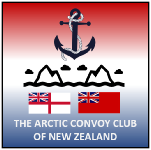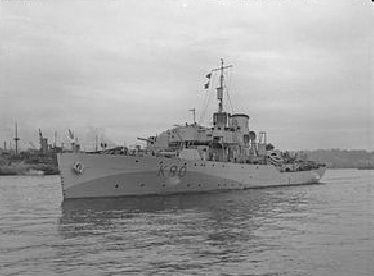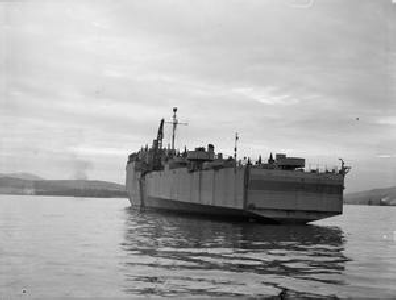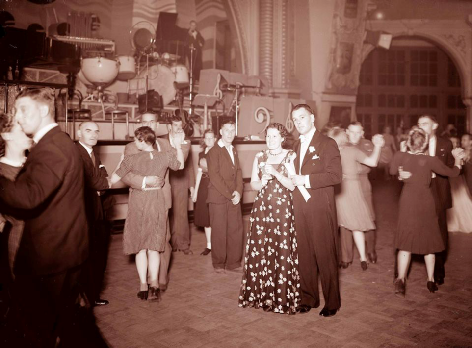The Arctic Convoy Club
of New Zealand

Veterans of the Arctic Convoys 1941 -



So many anecdotes and adventures come to mind, too numerous to cover here. Finally, in the middle of September 1943, while we were in Gibraltar, after a convoy to Malta and back, a signal arrived stating I was to be relieved and sent back to the UK for my CW posting to ‘King Alfred’, the RN officers’ training school. My relief duly arrived and I headed back to England by fast destroyer. It was on my 21st birthday, after a week at KA, when, although my signal and navigation tests were apparently OK – and my fingernails spotlessly clean, I received the thumbs down from the reviewing board and returned to active service, slightly crestfallen.
Fortunately, my unsuccessful spell at King Alfred meant that I was not on board on 17th February 1945 when the Bluebell was torpedoed by U711, coming out of Murmansk. She blew up immediately and there was only one survivor, not the man who relieved me in Gibraltar. Petty Officer Holmes was in the water for three quarters of an hour before being picked up by the destroyer HMS Zest. There were about fifteen men, like myself, who had been posted from the ship at various times and survived the sinking. We had a very emotional meeting in 1993 at a Flower Class Corvette reunion in the UK.
Briefly my naval career then continued with a spell on a Landing Ship Dock (HMS EASTWAY) taking part in the Normandy and Southern France invasions, a short trip to Bremerhaven and Hamburg as part of the liaison staff on a Free French Frigate, the Croix de Lorraine. And then after some enjoyable months working in the Admiralty ‘citadel’ in London, living ashore and able to enjoy the sights and sounds of London, I was finally released under class ‘A’ in April 1946.
HMS Eastway
It has been quite difficult trying to express in words what those sea-
Memories – 1942
In Liverpool City twin towers of the Liver Buildings (Liver as in Ivor) stand out against the sky-
Sailors’ thoughts of leave to come, home comforts, families, wives , girl friends, tiddly sailor suits unrolled, locker-
Mooring lines secured, fenders in place, gangway down. The Captain orders “Finished with engines” and the engine room telegraph clangs its message while way down below the Chief Engineer ensures last rites are performed and the engine room falls silent.
The lucky leave –takers already striding along the dockside to buses and trains while the few crew left on board settle down to a more peaceful existence; The ship is silent, no more engine throbbing, waves thumping, pots and pans banging. Just a peaceful quiet and a steady deck to walk along.
Is the war over ? Have we come in from the shooting, the explosions, the cries for help from water-
Liverpool will have its nightly air-
Liverpool people know all about war. Not just the bombing, the buildings and lives lost. But the men, Liverpool’s own merchant seamen, plain-
For the little ship it’s a boiler clean, paint and damage repair. Replenishing stores and ammunition; charts and code books to be corrected. The war isn’t over.
A daily walk up to the Liver Buildings for signals and mail. For the first day the pavement seems to rise and fall as the sailor, fresh from heaving deck, rolls his way among the busy crowds. But people don’t notice the navy-
The Signal Office and the Womens Royal Navy Service members (WRNS) all very friendly. “Dance tonight, Grafton Ballroom?” Always a demand for sailor partners. Uniform, number ones with Gold Badges. Silk scarf.
But shore leave in the city and the ‘Roebuck’ beckons its welcome. The model ship above the bar signifies the Bluebell’s adoption. The beer flows freely. Good friends, good talk, but remember the slogan above the picture of a sinking ship. ‘Careless Talk Costs Lives’.
Back on board after the evening on shore: maybe “We’ll meet again, don’t know where, don’t know when….” Vera Lynn lends us her words.
Again this strangeness of the silent ship, darkened mess-
Sometimes, during a quiet night watch, telegraphist and coder would talk of home, our next convoy operation, or the last, or next, run ashore. Sometimes the four hour watches seemed to last forever and it was always good, in the morning watch, 4 am to 8 am, to see the light sky appearing and the shapes of the merchant ships over to one side of us. The weather and seas were not always bad and sometimes in the Mediterranean, it was a real joy to come out at night on to the upper deck, with a clear sky and calm sea, or cruising along in the daytime, watching the deep blue sea creaming alongside.
Of the many convoys, in the Atlantic, the Mediterranean and up above the Arctic circle to Murmansk and Archangel, and of the enemy attacks by air and sea, there are already good and detailed records in many books. We had our fair share on the Bluebell and it was always so good to come steaming up the Mersey and see the Liver Building with the statuesque birds on their towers waiting to greet us. The Roebuck pub had adopted the crew and most would head straight there first night ashore, except for those lucky crew members getting seven days leave.
We did have an extensive refit in South Shields, near Newcastle, before going on our first Russian convoy. More armaments were added, the foc’sle lengthened to give an extended cover of decking nearly half way along the ship – supposedly to keep the inside dry ! The bridge was completely uncovered and widened to give better all round visibility and asdics were fitted. Later the bows were strengthened to cope with the Arctic ice. After sea trials and the compulsory working up of both ship and crew at Tobermory, we felt very much endeared to our newly furbished ship.
On the initiative of our Navigating Officer, and the Skipper, I was recommended as a CW candidate (for a commission), and papers to chart my progress while at sea were started for me. This meant that I did various sea-
Sometimes too, the O.O.W. would call for me to come up on the bridge. He was probably glad of the company and apart from instructing me in the art of conning the ship, navigation and general convoy procedures, we would talk of many other matters of home and the future, after the war. I do well remember one occasion when we were tucked away in a small bay below Murmansk, awaiting orders, the Skipper decided to take our ship’s boat away for a sail. He knew I had been a ‘week-
In September 1941 I enquired at the Royal Naval Recruiting Office in Southampton about enrolment in the Navy. By 6th December 1941, after “acceptance trials” and training in communications at Royal Arthur, a peacetime holiday camp at Skegness, I found myself, a fully fledged part of ‘the Andrew’ heading for Liverpool to join HMS Bluebell. I had enquired in Barracks as to what sort of warship the Bluebell was but the men who could probably best tell me were already out there in the murky Atlantic, or wherever, cursing the rolling and pitching corvettes and all those who had designed them. At the dockside I hesitated, as the Marine driver threw my bag and hammock out of the van, and a slight sense of panic set in. This surely must be the boat to take me out to the warship, I thought, but then I saw the board with BLUEBELL, facing the gangway, and the Marine said “This is it Jack, good luck, you’ll need it” then jumped in his van and drove away.
Although at first everything and everyone seemed so strange, I came to discover that the ninety crew on board were a closely knit bunch whose lives were in each other’s hands, everyone playing some part in getting the ship to whatever destination their Lordships at the Admiralty might decide to send us, and back again. Maybe there were plenty of times for arguments and almost coming to blows but generally things worked out quite well, as they had to on a ship only 203 ft long, and with a crew of 90, double the compliment it was designed for. Originally corvettes were intended for coastal waters protection work, not the deep sea work for which they came to be used.
The first trip was down to Gibraltar, just skirting the Bay of Biscay, escorting a convoy of merchant ships at an average speed of about seven knots. Then a few days in Gibraltar, shore leave, warnings not to drink the local brew, evenings at the many nightclubs and the realisation that everyone, while prepared to do everything for the good of the ship at sea, was intent on making the most of any shore leave, including rolling back to the ship, sufficiently drunk, and causing whatever mayhem a crowd of sailors could cause in the town. Although all this may seem pretty gross behaviour now, I must emphasise that our lives, especially at sea, were in many ways completely unnatural, more particularly to us civilian or HO (hostilities only) ratings. We were cramped up in a very small ship for days, weeks, or sometimes months, rolling and pitching, trying to stay in our bunks by jamming feet and arms into each corner, while buckets and kettles, anything that could break free, slid from one side of the sleeping quarters to the other. Probably also water washing around the mess deck having got in from outside on the upper deck.
The watch-
The experience of the sea’s motion was completely foreign to me of course, but it was a case of survival and getting used to it all. Fortunately I soon found my sea-
HMS Bluebell
Chris King P/JX 310293 : HMS Bluebell : My Story
Grafton Ballroom, Liverpool
So the easy routine continues. Daily work, daily walk. But must be on board for the mid-
Then the leave-
Now seven days leave for us diligent few who remained behind and carried the whole burden of ship-
Seven days leave, home comforts, food treats and a comfortable bed. How quickly is Liverpool forgotten. The little sailing dinghy moored in the harbour. Ready and waiting. Hoist sail and away. The house gatherings and days of leisure. No sailor suits. Just the comfortable shirt and greys. Good friends, all so nice. No boozy rough and tumbles here. God, if they only knew.
This is how it should be, neat bedcovers, a well laid table, and The people at Church are so looking forward to seeing you. You must wear your uniform. And We’ve been asked to lunch with the family up the road. You’ll meet their lovely daughter. She is studying theology and helps out at the soldiers’ canteen. Such a sweet girl.
And so the seven days pass all too quickly. But do I really want to be at home? Yes of course, but I do wonder what all the lads are doing and I do miss the mess deck gatherings for tot drinking times: I miss that laughing, sometimes sad-
And the last day of leave. Anguished farewells with the family. Perhaps a specially baked cake to take back. Maybe next time there will be longer leave. Where to now they wonder and for how long? The usual address for mail. Just the name and HMS Bluebell, c/o GPO London. But we really know where we are going. The new anorak suits give the game away.
Not wanting to go but impossible to stay. So it’s a long train journey back to ‘The Pool’ and the ship with steam up and ready for sea. Settling in again. Duty watches to organise. Cooks to the Galley. The never changing rum tot routine and the never-
And finally – Captain on the bridge. ‘Duty watch muster for leaving harbour’. Mooring wires in, the gangway inboard and it’s Port 15, Port 20, mind those dock gates. The ship moves out into the stream and sails smoothly down river at a steady 12 knots. All too soon she will join up with other escorting warships and heavily laden merchant ships. The crew now fully closed up for sea duties as the ship steams on.
The usual shipboard noises again, engines throbbing, ventilation fans whirring. Our lives trapped in this small ship soon to be running out of fresh food. No refrigeration, condensation running down the bulkheads and the interminable heaving and swaying as the ship makes her way up the coast to Loch Ewe, then Iceland and the long perilous journey up above the Arctic Circle to Murmansk, North Russia. For some of us it’s the same all over again. For the new crew members it’s a nervous apprehension. What happens on the way is anyone’s guess, but all part of the life we volunteered for and are committed to for some timeless period.
And back on land the Liverpool people still walk the city streets, still huddle in the shelters at night and, those sad eyes, will they remember or is there already someone else? Out here it’s just the sea and the little ship throbbing. Soldier, sailor or airman, all so different but each one a mother’s son. Maybe all in danger, perhaps not tonight, but tomorrow or next week. And will the Liver Birds again watch and welcome the little warship back in port again, that haven of safety for ship and crew.
There would be another welcome, maybe two or three, before fate intervenes as on that seventeenth day in February 1945 when U-
For those onboard HMS Bluebell when the torpedo struck, life came to an abrupt end – one man alone miraculously survived and rescued, after three quarter’s of an hour in freezing water only slightly warmed by the world-
No more shore leave or families to welcome them home. Just a watery grave without even a wooden cross to mark their passing. This was war. Cruel, heartless, unforgiving and only given to some to survive with memories, forever ingrained in the mind, of the strange and unnatural lives lived out in a war at sea. For the lucky ones, we few who had left the ship before that fatal February day, our lives would continue but knowing that a fateful sentence could be handed down at any time as long as the war went on.
Now, seventy years later – it wasn’t a dream was it? No, the reality returns again and again. But push it away. Just a short five years from one whole lifetime. A short five years that only those involved can be expected to share and understand.
In each of these lifetime years, a reminder. The Remembrance Days, the commemorative waterfront plaque, the wreath-
And those voices from the past – “Take this duffel-
And how to end these thoughts ?
Let Rupert Brooke speak my fondest memories –
“Breathless we flung us on the windy hill, laughed in the sun and kissed the lovely grass.”
CK. Wellington. November 2011



This website is owned by The Arctic Convoy Club of New Zealand © 2004 -
This page updated August 2018

This site uses images in SVG file format.
For best viewing results, please ensure you are using the latest version of your web browser.
| About Us |
| About Arctic Convoys |
| Convoy Kiwis |
| Greetings Exchange |
| Affiliations |
| Links |
| Topical Items |
| Decorations |
| Membership |
| My Story |
| Newsletter |
| Online Application Convoy Membership |
| Convoy Numbers |
| Merchant Navy Ships |
| Royal Fleet Auxiliary |
| Royal Navy Ships A - B |
| Royal Navy Ships C - F |
| Royal Navy Ships G - L |
| Royal Navy Ships M - O |
| Royal Navy Ships P - T |
| Royal Navy Ships U - Z |
| Obituaries |
| Wellington Memorials |